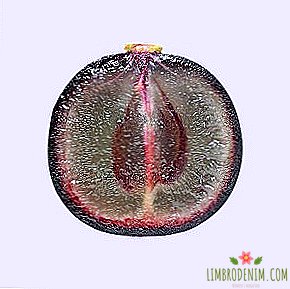From the "chicks" to the burning door of the FSB: What changed the life of Russia in 2015
The outgoing year was largely turning and crisis. - and not only in the economic sphere. Many invisible or ignored problems were first spoken out loud, and some were completely thought out for the first time. In social networks, and after them, in the media, questions and answers were sounded more often, which until recently were considered inconvenient: from open discussion of domestic violence and accusations of victims to domestic sexism and the right to abortion. We asked Maria Semendyayev to recall a dozen of important topics and events that stirred the public in 2015 - and I want to believe that the Russians (or at least part of them) changed their views in a positive way.
Family violence

At the beginning of this year, Anna Zhavnerovich, W-O-S editor, published an article about the personal violence she experienced herself, attaching photos of a swollen after a beating face with huge hematomas and a scan of the statement to the police. Anna's desire to bring the case to court and perseverance in the matter of compliance with all the formalities made her both a heroine and an object of hatred. After everything that was usually said in such cases was expressed ("I am guilty myself", "brought the guy", "this would not have happened to me", "dirty linen in public", "I would break his hands" and so on) It turned out that among the educated part of society there are quite a few people who consider violence against a partner to be an insufficient reason to “spoil a person’s life” with a statement to the police and public coverage in social networks. However, one goal was achieved immediately: after Anna, other women began to talk about their experiences, who sometimes suffered domestic violence for years and were ashamed to talk about it.
The published stories ultimately resulted in a discussion of why the victim in our society is still considered the culprit of rape, beatings or street harassment. It became clear that it was necessary to explain to women where and how they can ask for help, how to behave in the event of an attack, and most importantly, only the aggressor is to blame for domestic violence. However, this year's help was also required for specialists - the Sisters Center, which has been supporting women in such critical situations for many years, lost its state funding. Despite strong media support to the center, as well as a serious public interest in resolving the issue of domestic violence, the state is inclined to not punish, to the fullest extent of the law, those who beat for the first time — a bill with such a proposal was submitted this week in the State Duma.
Sexism

In March, on the website of Meduza came out explanatory cards on the problem of sexism, for the preparation of which they interviewed various specialists - including activist and journalist Bella Rapoport. However, the focus was not so much the content of the text, as the tweet, by which it was announced: "Guys, here is the instruction how not to offend the chicks." Talk about whether to consider it as irony or sexism is still considered by many to be incomplete and even immaterial. Bella set out her position in the response column, but her opponents continue to hold the view that you should not be offended by the provocative SMM, as well as the very word “heifers”.
The story, however, did not end there - the Bella column was shared on the same Meduza twitter with a comment: "Guys, look, our text inspired the chick to the column." The first joke could still be attributed to a specific sense of humor, known for the old Twitter feed “Ribbons”, which were led by the same people, but the second one already looked like a consistent position (for which the editors subsequently apologized). "Telokkoit" resulted in a dozen publications on the topic and hundreds of heated discussions on Facebook, but, unfortunately, they have not overcome the level of table talk. But at least a conversation has begun on how deep misogyny permeates Russian society.
Outing

This year made us think about very complex issues and learn many new words, which have no analogues in Russian. Outing is the disclosure of information about a person’s sexual orientation or gender identity without his consent or even knowledge. This summer, Ksenia Sobchak commented on Instagram-status of TV host Artem Korolev, saying that he was gay, but had to hide it in our intolerant society. Apart from the goal of this particular utterance and the double standards laid down in it, it is difficult to imagine a situation in which the auiting would be appropriate, unlike its opposite, the self-implemented coming-out.
The most famous Russian gay who publicly committed a coming-out, Anton Krasovsky, responded to the situation with a status about the essence of outing, which gathered several thousand likes. He recalled that one should not force a person to be brave forcibly, and outing emerged as a means of fighting the hypocrites in power, particularly in the US government, who advocated homophobic laws, practicing same-sex sex. Outing contributed a lot to the increase of tolerance towards gays in America, but in Russia the same technique predictably acquired a distorted look. Artyom Korolyov’s career didn’t affect Ksenia Sobchak’s statement, whereas in St. Petersburg a teacher was dismissed because of auiting, who was denounced by homophobic activist Timur Isaev.
Oncology

This year we have taken another step towards recognizing the fact that cancer is not a mysterious curse and not a life sentence, but a disease, which can and must be prevented and treated. Journalist Roman Super told how a tumor was found in his wife and they fought for her life together, going through all stages of treatment and reaching a successful remission. Much more tragic than the private history of Roman and his family, society experienced the death of Zhanna Friske from an inoperable brain tumor. For her treatment, money was collected all over the country, Channel One acted as an intermediary, and the amount reached 66 million rubles, but this did not help Joan to cope with the illness. We received another lesson in humility when student Dmitry Borisov died on an operating table, who had a 7-kilogram tumor cut out. Dmitry led a life-affirming blog, talked about how he was preparing for the operation, demonstrated the fighting spirit in every possible way, and collected all his money for the operation on Facebook.
Angelina Jolie showed courage in the face of the disease by deciding on preventive double mastectomy and telling about it openly - predictably the discussion of the breast of a Hollywood actress had an exciting effect on most fans argue on the Internet. On the one hand, oncology of public people this year recalled that everyone was equal before death, on the other hand, she provoked a discussion of the necessary, in the opinion of society, body parts of a woman, without which she allegedly cannot live.
Angelina Jolie's chest for some has become a symbol of the fight against inexorable death, and for others - a reason to joke about what else can be cut off in an attempt to deceive age and heredity. But, undoubtedly, thanks to the oncological topic that hit the central TV channels, many residents of Russia were able to learn about how important cancer prevention is and that recognized tumors are treated in time. Unfortunately, the coverage of the topic did not solve the problem of anesthesia, and seriously ill people continue to commit suicides - this year several dozen cancer patients committed suicide.
Inclusiveness

In August of this year, the 27-year-old sister of the supermodel and founder of the Naked Heart Foundation, Natalia Vodianova, was ousted from a cafe in Nizhny Novgorod. Oksana Vodianova has been living with autism and cerebral palsy since childhood, and her appearance and behavior were considered undesirable and frightening to potential visitors. According to Oksana's mother, they were threatened with being locked up in the basement, and then they called the police. Cafe staff justified by the fact that the behavior of Oksana seemed to them dangerous for her herself. This story raised the issue of tolerance of Russians to people with disabilities and drew attention to the difficulties that are encountered by mothers of children with disabilities.
So, in one of the Moscow schools, a 4th grade teacher was forced to take a daughter of 7 years old with Down syndrome to classes, because there was no one to sit with the girl. When the class ordered a group photo album, a picture of the teacher's daughter entered there, and the parents of the students made a scandal, refusing to pay for the work of the photographer. This story was widely publicized in social networks, where they discussed the legality of being in a class with ordinary students of a child who requires special attention.
It is indicative that mothers of special children disapproved of the decision to bring a 7-year-old girl with Down syndrome to a normal class, while many well-disposed commentators resented the cruelty of children and their parents in relation to the "sunny" child. The school in which this event took place is considered inclusive, but many of the participants in the discussion eluded the very meaning of inclusion - the equality of ordinary and special children. While we call some children "sunny", but at the same time, faced with their completely "non-sunny" side, we fall into a rage and rejection, about any inclusion is out of the question. It is impossible to regulate the attitude of a person to a person solely by regulations, you need to look for a way to talk about difficult and unpleasant topics.
HIV

This year, the Ministry of Health officially acknowledged that the HIV epidemic is developing in Russia, which, with the current control measures, could get out of control by 2020. Back in 2014, according to the Minister of Health Veronika Skvortsova, there were 12% more cases of infection than in 2013 — over 92 thousand new cases. In 2015, the trend has not changed: HIV-infected is becoming more and more. According to experts, in Russia, treatment basically begins from the moment HIV develops into AIDS, while many doctors, not to mention officials, consider patients unworthy of quality treatment. This was mentioned on the TV channel “Rain” and by a popularly favorite journalist and presenter Pavel Lobkov, saying that he is HIV-positive and lives with a diagnosis of more than ten years. This step provoked a lot of support in social networks and, I want to believe, helped a little to remove the stigma from the disease, which so far are not only afraid of what to say, but also think.
It is important to realize that the main risk group today is not only drug users, outcasts or teenagers engaged in unprotected sex. The main risk group is all of us, and often women of 25-32 years old, who are infected by their husbands who live with the virus and are unaware of it. At the same time, the Ministry of Health considers that the main weapon of protection against AIDS is not regular HIV testing and elimination of medical illiteracy in general, but loyalty to one partner and abstinence. Corresponding posters for December 1 - World Day for Protection against AIDS - can be seen in the subway. How many more people should become victims of conservatism treatment, while the Ministry of Health recognizes that condoms and sex education are more effective than tales of chastity?
Abortions and baby boxes

This summer, the legislators, who care about increasing the birth rate in the country in numerical terms, have distinguished themselves in particular activity. First, there was a proposal to abandon baby boxes - specially equipped boxes, in which the mother, who decided to abandon the child, can safely and anonymously carry the unwanted baby. The humanity of this idea would hardly need to be proved if it were not for the perverted logic of the officials. Having initially given the go-ahead to this project, they now believe that baby boxes advertise abandonment of children. Secondly, the governor of the Ulyanovsk region proposed to abandon free abortion, justifying this with references to Orthodoxy and the godlessness of killing a baby. The reality of Russian crime news, which daily brings information about the remains of newborn children found in garbage cans, in parks and on balconies of residential buildings, suggests that any such ban, in particular the withdrawal of abortions from CHI or the ban on abortions in private clinics, will worsen situation several times. Thirdly, in Altai, there was an initiative to punish the heads of medical institutions, which show insufficiently percussive birth rates.
All this brings us back to the conversation about the rights of women to their own body, to the freedom to make a decision on the preservation or termination of pregnancy. At the same time, the maternity capital program was recognized as successful and extended for another few years, and by 2018 they promise to increase the size of payments to half a million rubles. Perhaps money really remains one of the most effective ways to motivate families to give birth to second, third and subsequent children. However, there is no similar support for young single mothers — and if even one of these initiatives is adopted, a criminal abortion will become an epidemic like HIV.
Restriction of drug imports

Many people this year were faced with the requests of acquaintances to bring drugs from abroad that they haven’t been able to buy in Russia lately. The situation has deteriorated sharply since December 2015, when it was forbidden to include foreign drugs, which have at least two Russian counterparts, in public procurement. Doctors are in a quiet panic, not to mention patients - now free medicine will have to buy cheaper Russian, instead of high-quality western medicine, which sometimes differs markedly from its counterpart in quality and even in the presence of effect.
Patients with oncology, blood diseases and diabetes immediately felt the effect of the new law, as some Russian drugs are capable of giving complications, in contrast to the more expensive and more foreign-tested. Of course, there is always the opportunity to buy the right medicines for your money - they are often sold in the same hospitals - but this means that the state recognizes the complete failure of free medicine. Being treated at public expense in the near future may become not only difficult - due to the consolidation of medical institutions and the course to reduce costs - but also unsafe. It is tempting to talk about how much money is spent on fuel for bombers instead of hospitals, but such claims are always the answer to the common good. Maybe next year the common good will finally become a dirty word.
Charity

The “Need Help” charity foundation launched this May its own media called “Such Cases”, where stories of people and organizations that need help are published. Through this portal, we learned about dozens of initiatives that make our lives a little better. Children's hospices, training apartments for people with autism, orphanages and small initiative groups, such as the Sisters Center, which helps women survive family violence. Charity in 2015 finally occupied the niche of the main civic initiative. In a situation where the state offers treatment for their money, reduces the number of ambulances and prohibits receiving painkillers without a few certificates of the appropriate sample, the only thing that remains is crowdfunding and community assistance.
The most life-affirming story on this topic is the relocation of several children with multiple developmental disorders from an ordinary state-owned house to a “little house” - St. Sophia orphanage for disabled children. In this house for 22 children, educators, teachers and doctors created conditions as close as possible to home ones. The journalist Vera Shengelia regularly talks on her facebook about the work of this house and its amazing inhabitants. The story of the boy Horus, who recently had a complicated bladder repair operation in the UK, became a real Christmas miracle long before Christmas — at least for those who watched her. All this raised and painful for the Russian health care system the question of allowing parents to be present in intensive care with young children. By the example of Gore, it became clear that the same child could not be treated at all, with a loved one holding hands, or in a cold box, flooded with light, in absolute solitude and horror, which is familiar to anyone who visited Soviet-Russian the hospital.
Protest art

A month ago, St. Petersburg artist Peter Pavlensky went to the doors of the historical building of the FSB in Lubyanka, doused them with gasoline, set it on fire, and was photographed against a background of fire. Pavlensky was literally immediately detained, accused of hooliganism and damage to property, but he demands to judge him for terrorism and gives interviews from behind the bars that his action is a symbolic act. As in the case of the Pussy Riot group, Pavlensky didn’t become a star at all at once - a year and a half has passed since he nailed his scrotum to Red Square. Из интервью его соратницы и матери его двух дочерей мы узнали, что семья, в частности, не отправляет детей в школу, потому что там воспитывают людей-болванок для нужд государства.
Сам Павленский признаёт, что его вдохновили акции Pussy Riot, но в символизме он пошел по пути мощной простоты: вместо нескольких людей - он один, вместо ярких цветов - суровый черный или нагота, вместо музыки - тишина или потрескивание пламени. The contemporary artist once again forced the whole society to discuss whether his action is an art or still a political action and how permissible it is to spoil state property, even for a radical performance. There are no unequivocal answers to these questions, nor is there an unequivocal assessment of such a phenomenon as artistic actionism, and this is perhaps the main lesson to be learned by the participants in the public debate. I would like to hope that in 2016 in the discussion of artistic actions, we will finally move from the item "Is it art?" to the point "is this political repression?". Well, and then, finally, it will be possible to fully discuss the timeless “Bolotnaya case”, which is still acquiring new defendants.
LGBT

In September, Roskomnadzor introduced the group VKontakte Children-404, where homosexual teenagers could anonymously share their stories, to the list of prohibited sites — and the founder of the group, Elena Klimova, published an album with photos of people who threatened her personally. There were hardly fewer attacks on homosexuals and on those who seemed homosexual to homosexual than in the past - for example, unknown people beat the visitors of the St. Petersburg LGBT festival “Side by Side”. We can also recall the already mentioned story of a teacher from St. Petersburg who was accused of "immorality" and dismissed after a homophob activist decided to spread information about her personal life.
All stories of harassment and persecution of people on the basis of their differences from others are equally disgusting and are almost always exactly the same in retelling. Looking at the collages published by Elena Klimova from "Children-404", we see smiling mothers and fathers, with photos of which the dirtiest words are side by side, whole tirades of hatred, which they wrote to the address of a completely unfamiliar girl. It’s not a surprise that no one is protected from intolerance and aggression - either on the street or on Facebook - but such stories show how much our entire society is permeated with them. Even the most intelligent and educated people are susceptible to homophobia, misogyny, and insensitive to the problems of people with disabilities. Respect for oneself is impossible without respect for others and their views (except for discriminatory ones), and to recognize that we are all different, but equal, is already a minus one lie and injustice.

Photo: 1, 2, 3, 4, 5, 6, 7, 8 via Shutterstock, Hey Girrl Shop, Zazzle.com, Farfetch




